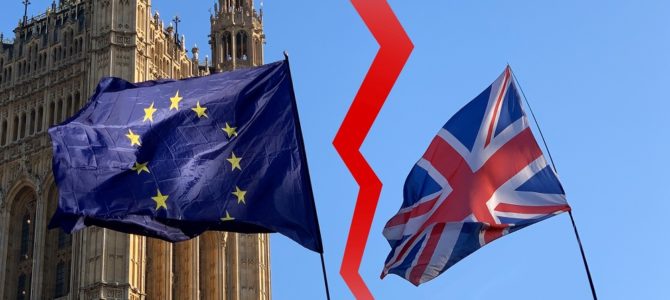
While most individuals on both sides of the Atlantic spent last week focused on the coronavirus pandemic, the build-up to the Christmas holidays, or both, a small group of individuals worked on events of a different sort. On Christmas Eve, negotiators for the government of British Prime Minister Boris Johnson and the European Union announced they had reached an agreement in principle on a trade deal.
While the UK officially left the European Union on Jan. 31, a “transition agreement” in place through Dec. 31 meant that, for most practical purposes, UK citizens saw little change in their status vis-à-vis the EU during 2020. The EU had insisted on the UK first leaving the organization before negotiating an agreement defining their future trading relationship—somewhat akin to a couple physically separating before finalizing their divorce.
But with the transition agreement days away from expiring—a deadline Johnson’s government insisted it would not extend—negotiators frantically raced to reach agreement before Dec. 31. After several instances of “will they or won’t they?” when it seemed likely the two sides would not finalize a deal, the trade teams arrived at an agreement one week before the deadline.
What It Doesn’t Do
In many ways, both opponents and proponents of the trade deal will fixate on what the agreement does not do, rather than what it does. Proponents of the agreement will trumpet the fact that it avoids a “no deal” Brexit, a fact that has obsessed both pundits and the public in Britain for the last year-plus.
The recent lines of trucks queuing for miles and miles in southeast England provided some foretaste of what a “no deal” Brexit might have entailed. In this case, the queues occurred over the past week because the French government temporarily closed the border and imposed new restrictions upon its reopening, to contain a purportedly more infectious strain of COVID spreading in Britain. But the checks related to COVID presaged what the French government and other EU countries could have imposed had the UK not reached agreement on a trade deal.
Johnson said for months he preferred a “no deal” Brexit to an agreement that did not respect the UK’s sovereignty. But with both the UK and EU economies struggling from coronavirus-related lockdowns, neither wanted to inflict the damage that would come from an abrupt, and relatively chaotic, change to their trading relationship. While finalizing an agreement only a week before the deadline means businesses will still face much uncertainty after December 31, that level of uncertainty pales in comparison to a British crash-out from the EU.
‘Hard’ Brexit
While proponents of the agreement will applaud the fact that the UK avoided a “no deal” scenario, opponents of Johnson’s Conservative government have focused on the relatively “hard” nature of the Brexit agreement. It will see the UK outside the EU common market and customs union.
While the agreement preserves tariff-free access for British goods and some services, those goods will face additional customs paperwork and the potential for non-tariff barriers come Jan. 1. The agreement also largely leaves unanswered the question of whether the UK’s lucrative financial services industry will have continued easy access to EU markets.
In laymen’s terms, the agreement allows some divergence between the UK and EU regulatory models. Because the UK embarked on Brexit to take back its sovereignty, the Conservatives in Johnson’s government did not want to have to conform to EU laws and regulations that it no longer has any say in developing, or abide by rulings of the European Court of Justice.
While the agreement gives the UK back that sovereignty, it also means EU regulators could deny access to goods that no longer comply with, for instance, EU food safety laws. However, no longer having to conform to EU laws and regulations means an independent UK could strengthen its ties with the United States, or other nations with whom it wishes to grow its trade links.
Ramifications within the UK
Even as the agreement gives the UK the opportunity to redefine its global relationships—whether with the EU, the United States, or others—it could also affect the internal affairs of the United Kingdom. The Scottish National Party (SNP) has used the agreement’s version of a “hard Brexit” to make the case for Scotland to declare its independence from the UK.
In 2014, Scotland voted to reject independence, in what the SNP at the time called a “once-in-a-generation” referendum. But two years later, Scotland gave 62 percent of its votes to remain in the EU, even as the UK as a whole voted by a 52-48 percent margin to exit the European Union in the 2016 plebiscite.
The SNP has raised the prospect of “Scotland being taken out of the EU against its will” to argue for a second referendum on independence. Johnson to date has rejected calls for another independence vote, citing the generational nature of the 2016 referendum. But if the SNP wins an outright majority in next May’s elections to the Scottish Parliament—a likely outcome based on most polling since Johnson won a big majority in UK elections last December—the calls for another independence vote may prove too big to ignore.
‘Got Brexit Done’
For the time being, however, Johnson can celebrate achieving his promise made during last December’s election campaign to “Get Brexit Done.” He took office last summer knowing that the issue of the UK’s relationship with the EU had played a major role in the departure of the last four Conservative prime ministers—Margaret Thatcher, John Major, David Cameron, and Theresa May.
By reaching an agreement with the EU to exit the bloc, Johnson has potentially seen off the issue that so flummoxed his predecessors. But how the UK adapts to its new relationships with Europe and other countries—and how the constituent nations of the UK respond to those changes—will do much to define the remainder of his premiership, and Britain’s role in a changing world.









